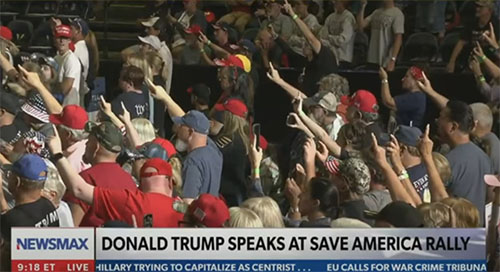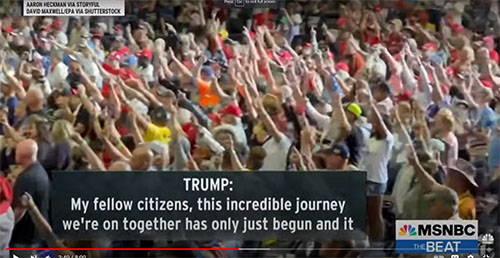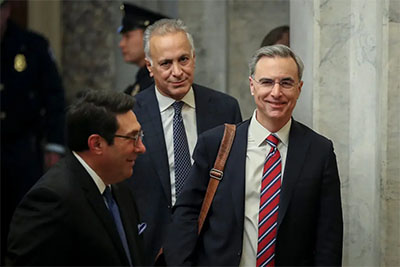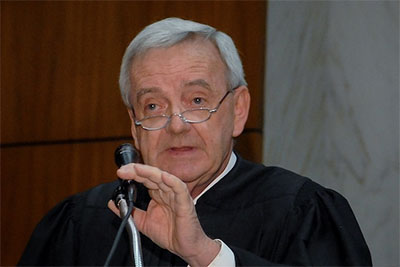Brief of the States of Texas, Florida, Indiana, Kentucky, Mississippi, Missouri, Montana, Louisiana, South Carolina, Utah, and West Virginia as Amici Curiae in Support of Plaintiff-AppelleeDonald J. Trump, Plaintiff-Appellee, v. United States of America, Defendant-Appellant.
September 20, 2022
No. 22-13005
In the United States Court of Appeals
for the Eleventh Circuit
Donald J. Trump,
Plaintiff-Appellee,
v.
United States of America,
Defendant-Appellant.
On Appeal from the United States District Court
for the Southern District of Florida
BRIEF OF THE STATES OF TEXAS, FLORIDA, INDIANA, KENTUCKY, MISSISSIPPI, MISSOURI, MONTANA, LOUISIANA, SOUTH CAROLINA, UTAH, AND WEST VIRGINIA AS AMICI CURIAE IN SUPPORT OF PLAINTIFF-APPELLEEKen Paxton
Attorney General of Texas
Brent Webster
First Assistant Attorney General
Office of the Attorney General
P.O. Box 12548 (MC 059)
Austin, Texas 78711-2548
Tel.: (512) 936-1700
Fax: (512) 474-2697
Judd E. Stone II
Solicitor General
Ari Cuenin
Deputy Solicitor General
William F. Cole
Assistant Solicitor General
William.Cole@oag.texas.govAttorneys for Amici Curiae
Certificate of Interested PersonsNo. 22-13005
Donald J. Trump,
Plaintiff-Appellee,
v.
United States of America,
Defendant-Appellant.
Amici Curiae certify that the following is a complete list of interested persons as required by Federal Rule of Appellate Procedure 26.1, and Eleventh Circuit Rules 26.1-1, 28-1(b), and 29-2:
1. American Broadcasting Companies, Inc. (DIS)
2. Associated Press
3. Ayer, Donald B.
4. Bloomberg, LP
5. Bellinger III, John B.
6. Bratt, Jay I.
7. Brill, Sophia
8. Brower, Gregory A.
9. Cable News Network, Inc. (WBD)
10. Cameron, Daniel J.
11. Cannon, Hon. Aileen M.
12. Caramanica, Mark Richard
13. CBS Broadcasting, Inc. (CBS)
14. Cole, William F.
15. Corcoran, M. Evan
16. Cornish, Sr., O’Rane M.
17. Cuenin, Ari
18. Cunningham, Clark
19. Dearie, Hon. Raymond, J.
20. Democracy 21
21. Dow Jones & Company, Inc. (DJI)
22. Edelstein, Julie
23. Eisen, Norman L.
24. E.W. Scripps Company (SPP)
25. Farmer Jr., John J.
26. Fischman, Harris
27. Finzi, Roberto
28. Fitch, Lynn
29. Fry, Samantha C.
30. Fugate, Rachel Elise
31. Gerson, Stuart M.
32. Gonzalez, Juan Antonio
33. Gray Media Group, Inc. (GTN)
34. Griffith, Hon. Thomas B.
35. Gupta, Angela D.
36. Halligan, Lindsey
37. Huck, Jr., Paul
38. Inman, Joseph M.
39. Jones, Hon. Barbara S.
40. Karp, Brad S.
41. Keisler, Peter D.
42. Kessler, David K.
43. Kise, Christoper M.
44. Knopf, Andrew Franklin
45. Knudsen, Austin
46. Lacosta, Anthony W.
47. Landry, Jeff
48. LoCicero, Carol Jean
49. McElroy, Dana Jane
50. Minchin, Eugene Branch
51. Moody, Ashley
52. Morrisey, Patrick
53. NBC Universal Media, LLC (CMCSA)
54. Norman Eisen PLLC
55. Olsen, Matthew G.
56. Patel, Raj K.
57. Paul, Weiss, Rifkind, Wharton & Garrison LLP
58. Paxton, Ken
59. Raikita, Philip
60. Raul, Alan Charles
61. Reeder, Jr., L. Martin
62. Reinhart, Hon. Bruce E.
63. Reyes, Sean
64. Rokita, Todd
65. Rosenberg, Robert
66. Schmitt, Eric
67. Seidlin-Bernstein, Elizabeth
68. Shapiro, Jay B.
69. Shullman, Deanna Kendall
70. Smith, Jeffrey M.
71. State of Florida
72. State of Indiana
73. State of Kentucky
74. State of Mississippi
75. State of Missouri
76. State of Montana
77. State of Louisiana
78. State of South Carolina
79. State of Texas
80. State of Utah
81. State of West Virginia
82. Stearns Weaver Miller Weissler Alhadeff & Sitterson, P.A.
83. Stone, Judd E.
84. The New York Times Company (NYT)
85. The Palm Beach Post
86. Times Publishing Company
87. Tobin, Charles David
88. Troye, Olivia
89. Trump, Donald J.
90. Trusty, James M.
91. United States of America
92. Webster, Brent
93. Weld, William F.
94. Wertheimer, Fred
95. Whitman, Christina Todd
96. Wilson, Alan
97. WP Company LLC
No publicly traded company or corporate entity has an interest in the outcome of this case or appeal.
/s/ William F. Cole
William F. Cole
Counsel of Record for
Amici Curiae
Table of ContentsPage
Certificate of Interested Persons ............................................................................... i
Table of Authorities ............................................................................................... vii
Interests of Amici Curiae ......................................................................................... 1
Argument ................................................................................................................. 2
Conclusion .............................................................................................................. 11
Certificate of Compliance ...................................................................................... 12
Certificate of Service .............................................................................................. 12
Table of AuthoritiesPage(s)
Cases
Ala. Ass’n of Realtors v. Dep’t of Health & Human Servs.,
141 S. Ct. 2320 (2021) ......................................................................................... 6
Ala. Ass’n of Realtors v. Dep’t of Health & Human Servs.,
141 S. Ct. 2485 (2021) (per curiam) .................................................................... 6
BST Holdings, L.L.C. v. OSHA,
17 F.4th 604 (5th Cir. 2021) ................................................................................ 7
City & Cnty. of S.F. v. U.S.C.I.S.,
992 F.3d 742 (9th Cir. 2021) ........................................................................... 4, 5
DHS v. New York,
140 S. Ct. 599 (2020) .......................................................................................... 4
DHS v. New York,
141 S. Ct. 1370 (2021) .......................................................................................... 4
Heckler v. Cmty. Health Servs. of Crawford Cnty.,
467 U.S. 51 (1984) ............................................................................................... 2
NFIB v. Dep’t of Labor,
142 S. Ct. 661 (2022) ........................................................................................... 7
Rock Island A. & L. R. Co. v. United States,
254 U.S. 141 (1920) ............................................................................................ 2
Texas v. Biden,
20 F.4th 928 (5th Cir. 2021) ........................................................................... 3, 4
Texas v. United States,
No. 6:21-cv-00016, 2022 WL 2109204 (S.D. Tex. June 10, 2022) ................. 7, 8
United States v. Armstrong,
517 U.S. 456 (1996) ............................................................................................. 2
United States v. Chem. Found., Inc.,
272 U.S. 1 (1926) ................................................................................................. 2
United States v. Winstar Corp.,
518 U.S. 839 (1996) ............................................................................................. 2
Wolf v. Cook County, Ill.,
140 S. Ct. 681 (2020) .......................................................................................... 4
Other AuthoritiesCarl Zimmer & James Gorman, Fight Over Covid’s Origins Renews
Debate on Risks of Lab Work, N.Y. Times (Oct. 12, 2021) ................................... 9
Dustin Volz, DHS Folds Disinformation Board After Criticism Over
Threat to Free Speech, Wall Street Journal (Aug. 25, 2022) ................................. 9
Eileen Sullivan & Miriam Jordan, Illegal Border Crossings, Driven by Pandemic
and Natural Disasters, Soar to Record High, N.Y. Times (Oct. 22, 2021) ............ 9
Joshua Lee, Newly released emails show coordination between social media
companies and Biden administration on COVID information, Deseret
News (Sept. 7, 2022) .......................................................................................... 8
Meet the Press, NBC News television broadcast Sept. 11, 2022,
Transcript at
https://tinyurl.com/yzdcwvme .................................................... 9
President Biden, Remarks on Fighting the COVID-19 Pandemic, The
White House (Aug. 03, 2021) ............................................................................. 6
Press Secretary Jen Psaki, Press Briefing, The White House (July 23, 2021) ........... 7
Santiago Perez & Michelle Hackman, Record Number of Migrants
Arrested at Southern Border, with Two Million Annual Total in Sight,
Wall Street Journal (Aug. 15, 2022) .................................................................. 10
Sharon Lerner & Mara Hvistendahl, New Details Emerge About
Coronavirus Research at Chinese Lab, The Intercept (Sept. 6, 2021) .................... 9
Steven Nelson, Joe Biden says he won’t mandate getting COVID-19
vaccine, wearing masks, N.Y. Post (Dec. 4, 2020) ................................................ 7
Southwest Land Border Encounters, U.S. Customs & Border Patrol,
https://tinyurl.com/kh8ycxu7 (last accessed Sept. 17, 2022) ........................... 10
Interests of Amici CuriaeIn response to the Biden Administration’s unprecedented nine-hour search of former President Donald J. Trump’s private residence and its seizure of more than 10,000 documents, President Trump filed a lawsuit seeking the return of privileged and potentially privileged documents that were taken during the Biden Administration’s raid.
In the light of the extraordinary circumstance of a presidential administration ransacking the home of its one-time—and possibly future—political rival, President Trump filed a motion to appoint a special master to adjudicate potential claims of attorney-client and executive privilege and to temporarily enjoin the Biden Administration from utilizing these materials for investigative purposes until the special master completes his review.
After a full round of briefing and two hearings,
the district court issued a carefully reasoned order appointing a special master and temporarily enjoining the Biden Administration from utilizing a discrete subset of the documents seized for criminal investigative purposes. The court concluded that such measures were warranted to respect “the interests and appearance of fairness and justice,” which were paramount
given the “swirling allegations of bias and media leaks” and deficiencies in the Biden Administration’s screening process for potentially privileged materials.Throughout this litigation the Biden Administration has attempted to trade on the reputation of the Department of Justice and the Intelligence Community to thwart the appointment of a neutral special master. But the district court twice rejected that gambit, and this Court should too.
Amici States have been frequent litigants against the Biden Administration, and they offer this amicus brief to highlight how the Administration’s conduct in connection with this case is of a piece with the gamesmanship and other questionable conduct that have become the hallmarks of its litigating, policy-making, and public-relations efforts. At a minimum, this Court should view the Administration’s assertions of good-faith, neutrality, and objectivity through jaundiced eyes. Consequently, this Court should reject the Administration’s request to stay the district court’s order pending appeal and instead permit this document dispute to proceed before a neutral special master.ArgumentIt is a well-established axiom that “[m]en must turn square corners when they deal with the Government.” Rock Island A. & L. R. Co. v. United States, 254 U.S. 141, 143 (1920) (Holmes, J.). But an important corollary to this principle is that “‘the Government should turn square corners in dealing with the people.’” United States v. Winstar Corp., 518 U.S. 839, 886 n.31 (1996) (quoting Heckler v. Cmty. Health Servs. of Crawford Cnty., 467 U.S. 51, 61 n.13 (1984)). The latter principle is a key assumption undergirding the “‘presumption of regularity’” that courts afford government officials, and which “presume[s]” such officials “have properly discharged their official duties.” United States v. Armstrong, 517 U.S. 456, 464 (1996) (quoting United States v. Chem. Found., Inc., 272 U.S. 1, 14-15 (1926)).
In this sui generis case, however, there is reason to doubt that this presumption of regularity should be afforded to the decisions of the Biden Administration in connection with the raid of, and seizure of documents from, the personal residence of President Trump. The district court recognized as much by appointing a special master to review the set of documents at issue, by refusing “to accept the Government’s conclusions” about the contents of the seized documents, and by observing that “evenhanded procedure does not demand unquestioning trust in the determinations of the Department of Justice.” A6-7, 12. This approach was particularly necessary here given the “undeniably unprecedented nature of the search of a former President’s residence” coupled with the “swirling allegations of bias and media leaks.” A24, 32; see also A23 n.11 (noting the Government’s counsel’s “candid[] acknowledge[ment] [of] the unfortunate existence of leaks to the press”).
But in addition to these compelling circumstances, the Administration’s questionable conduct in the litigation and policy-making spheres—which has provoked the ire of several federal judges— further supports affirming the district court’s sound decision to proceed with caution via a special master.
1. Take the Administration’s resort to procedural gamesmanship to overcome adverse judicial decisions. In Texas v. Biden, for example, a district court vacated two memoranda issued by the Secretary of the Department of Homeland Security, concluding, after a bench trial, that those agency actions violated the Administrative Procedure Act and relevant provisions of the Immigration and Naturalization Act. 20 F.4th 928, 941-44 (5th Cir. 2021), vacated on other grounds by 142 S. Ct. 2528 (2022). The Biden Administration appealed that final judgment, but just two business days before oral argument in the Fifth Circuit, it issued two new memoranda purporting to supersede the already-vacated ones. Id. at 942. Hours later, it filed a twenty-six-page motion arguing that the case was moot and that the Administration was entitled to vacatur of the district court’s order—the precise remedy it had hoped to obtain on appeal. Id.
The Fifth Circuit rejected the Biden Administration’s eleventh-hour ploy. It held that the Administration’s conduct was marred by “repeated[]. . . gamesmanship in its decision-making” at all phases, including through the administrative process, in the district court, and on appeal. Id. at 962-63. Accordingly, the Court concluded that the Administration could not take advantage of the voluntary-cessation exception to mootness; its attempt to moot the case was mere “litigation posturing.” Id. at 962. Furthermore, the Court held that, even if the case were moot, the Biden Administration would not be entitled to the “equitable remedy” of vacatur because it “is unavailable to parties with unclean hands” and the Biden Administration’s “litigation tactics disqualify it from such equitable relief.” Id. at 942; see also id. at 998 (holding that “DHS’s litigation tactics tilt the equities decidedly against vacatur”).
2. Or consider the Biden Administration’s collusion with private parties to circumvent ordinary rules for administrative rulemaking. Upon taking office, the Biden Administration stopped defending a host of rules that had been promulgated by the Trump Administration and challenged in court; one such rule was the Trump Administration’s rule defining a “public charge” under federal immigration law. See City & Cnty. of S.F. v. U.S.C.I.S., 992 F.3d 742, 743 (9th Cir. 2021) (VanDyke, J., dissenting).
The Supreme Court had previously stayed lower-court orders preliminarily enjoining the Trump Administration’s “public charge” rule, see DHS v. New York, 140 S. Ct. 599, 599 (2020); Wolf v. Cook County, Ill., 140 S. Ct. 681, 681 (2020), and later granted certiorari in one of those cases, see DHS v. New York, 141 S. Ct. 1370 (2021). Yet just two months after taking office, the Biden Administration, in coordination with the plaintiffs, began rapidly dismissing those cases (including the one pending at the Supreme Court) and entered into a joint stipulation with one set of plaintiffs that “acquiesced in a single judge’s nationwide vacatur of the rule.” City & Cnty. of S.F., 992 F.3d at 743 (VanDyke, J., dissenting). Thereafter, the Biden Administration “leveraged that now-unopposed vacatur to immediately remove the rule from the Federal Register” and “quickly engaged in a cursory rulemaking stating that the federal government was reverting back to the Clinton-era guidance—all without the normal notice and comment typically needed to change rules” under the APA. Id.
As one Circuit Judge explained, this “coordinated settlement” was highly “inequitable.” Id. at 754. It was “a transparent attempt by a new federal administration and its prior litigation opponents to not only rid the federal government of a now-disfavored rule, but also to avoid the APA’s procedures in changing that rule and force any future administration that wants to enact a similar rule to fight against the strong headwinds of dubious . . . precedent” that the Supreme Court was poised to address. Id. Such “collusive actions” by the Administration were an affront to “good government” and robbed the public of “participation in rule changes.” Id. at 749- 50.
3. When it is unable to engage in procedural gamesmanship to cast aside unfavorable judicial decisions or engineer a collusive settlement to preempt them, the Biden Administration has resorted to blinding itself to adverse precedent and its prior representations altogether. For example, in June 2021, the Supreme Court declined to vacate a stay of a district court’s order holding that the Centers for Disease Control (“CDC”) exceeded its statutory authority when it imposed a nationwide eviction moratorium for certain properties. See Ala. Ass’n of Realtors v. Dep’t of Health & Human Servs., 141 S. Ct. 2320 (2021) (mem.). Although five Justices agreed that the challengers were likely to succeed on the merits of their claim that the CDC exceeded its statutory authority, Justice Kavanaugh voted to deny the application to vacate the stay only “[b]ecause the CDC plans to end the moratorium in a few weeks.” Id. at 2321 (Kavanaugh, J., concurring).
Undaunted by the disagreement of a majority of the Supreme Court with its operative legal theory, however, the Biden Administration boldly reimposed the eviction moratorium just three days after the prior version expired. Ala. Ass’n of Realtors v. Dep’t of Health & Human Servs., 141 S. Ct. 2485, 2488 (2021) (per curiam). The President candidly admitted that “[t]he bulk of the constitutional scholarship says that it’s not likely to pass constitutional muster.” President Biden, Remarks on Fighting the COVID-19 Pandemic, The White House (Aug. 03, 2021), available at https://tinyurl.com/3dx6knmh. Nevertheless, he justified the reimposition of the eviction moratorium by resort to principles of realpolitik: “by the time it gets litigated, it will probably give some additional time while we’re getting that $45 billion out to people who are, in fact, behind in the rent and don’t have the money.” Id. Less than a month after those remarks, the Supreme Court granted an application to vacate a stay of a district court’s order finding the new moratorium unlawful and holding that the CDC lacked statutory authority to impose the eviction moratorium. 141 S. Ct. at 2490.
The Biden Administration took a similar approach—and was greeted with a similar fate—less than two months later when it attempted to impose a nationwide COVID-19 vaccine mandate. The President had insisted that he lacked the authority to impose such a nationwide mandate. See, e.g., Steven Nelson, Joe Biden says he won’t mandate getting COVID-19 vaccine, wearing masks, N.Y. Post (Dec. 4, 2020),
https://tinyurl.com/46prps23 (“No, I don’t think it should be mandatory. I wouldn’t demand it be mandatory.”); see Press Secretary Jen Psaki, Press Briefing, The White House (July 23, 2021),
https://tinyurl.com/75frsdeb (“[T]hat’s not the role of the federal government.”).
But after the Administration’s patience wore thin with the slowing rate of voluntary vaccination, it devised the vaccine mandate, implemented in November 2021 by the Occupational Safety and Health Administration (“OSHA”), as a “legislative ‘work around.’” NFIB v. Dep’t of Labor, 142 S. Ct. 661, 668 (2022) (Gorsuch, J., concurring) (quoting BST Holdings, L.L.C. v. OSHA, 17 F.4th 604, 612 (5th Cir. 2021)).
After a flurry of challenges by States and private parties, the Fifth Circuit stayed the vaccine mandate’s implementation. BST Holdings, 17 F.4th at 609. The Supreme Court later agreed that the Biden Administration lacked statutory authority for its vaccine mandate. NFIB, 142 S. Ct. at 665-66.
The Biden Administration’s penchant for taking litigation positions that contradict its actions is typified by its conduct in Texas v. United States, No. 6:21-cv-00016, 2022 WL 2109204 (S.D. Tex. June 10, 2022), denying motion for stay pending appeal, 40 F.4th 205 (5th Cir. 2022), granting certiorari before judgment, No. 22-58, 2022 WL 2841804 (U.S. July 21, 2022). There, a district court set aside several immigration memoranda setting priorities for apprehending and removing classes of aliens. 2022 WL 2109204 at *2. The court held that the Biden Administration’s attempt to set “priorities” for apprehension and removal flouted the mandatory duties that Congress imposed on the executive branch under the Immigration and Naturalization Act. Id.
Relevant here, the district court rejected the Administration’s argument that its statutory duties could not be mandatory because the government had “insufficient resources and limited detention capacity.” Id. at *30. The court found that the Biden Administration had “not acted in good faith” in making this argument. Id. After all, despite repeatedly “trumpet[ing]” its lack of resources to detain aliens and pointing the finger at Congress, the district court found that “[a]t the same time” the Administration “ha[d] submitted two budget requests in which it ask[ed] Congress to cut those very resources and capacity by 26%.” Id. (emphasis original). Moreover, the court found that the Administration had “persistently underutilized existing detention facilities.” Id. As the district court put it, “[t]o say that this is incongruous is to say the least.” Id.
4. The Biden Administration’s knack for gamesmanship and other questionable conduct has not been cabined to courtrooms, but it has also infected its policymaking and public-relations efforts.
For example, the Biden Administration has reportedly been working hand-in-glove with social-media companies—applying pressure where necessary—to censor online content that it believes constitutes “disinformation.” See Joshua Lee, Newly released emails show coordination between social media companies and Biden administration on COVID information, Deseret News (Sept. 7, 2022), https://tinyurl.com/k8rpcf95. The Administration even attempted to set up a dystopian “Disinformation Governance Board,” ostensibly designed to “counter disinformation deemed a threat to homeland security,” until public outrage over the threats the Board posed to freedom of speech forced the Administration to shelve the idea. Dustin Volz, DHS Folds Disinformation Board After Criticism Over Threat to Free Speech, Wall Street Journal (Aug. 25, 2022),
https://tinyurl.com/2p834teu.
Likewise, the Biden Administration has insisted—both on television and in congressional hearings—that the government did not fund so-called “gain of function” research into coronaviruses in China’s Wuhan Institute of Virology. See Carl Zimmer & James Gorman, Fight Over Covid’s Origins Renews Debate on Risks of Lab Work, N.Y. Times (Oct. 12, 2021), https://tinyurl.com/bdc5mfa7. Yet internal government documents uncovered through a FOIA request revealed that the government did, in fact, award more than half-a-million dollars to at least one non-profit for research at the Wuhan lab into “bat coronaviruses likely to infect humans.” Sharon Lerner & Mara Hvistendahl, New Details Emerge About Coronavirus Research at Chinese Lab, The Intercept (Sept. 6, 2021),
https://tinyurl.com/2p8arbwd.
And just last week Vice-President Kamala Harris, in a nationally televised interview on “Meet the Press,” asserted that the United States’ Southern border is “secure.” Meet the Press, NBC News television broadcast Sept. 11, 2022, Transcript at https://tinyurl.com/yzdcwvme. Yet the facts gathered by her own administration are decidedly contrary to this puzzling statement: last year Customs and Border Patrol (“CBP”) recorded 1.7 million illegal border crossings—a level not seen since the 1960s. Eileen Sullivan & Miriam Jordan, Illegal Border Crossings, Driven by Pandemic and Natural Disasters, Soar to Record High, N.Y. Times (Oct. 22, 2021),
https://tinyurl. com/3n46psxp. And this year, illegal border crossings are all but certain to surpass 2 million. See Santiago Perez & Michelle Hackman, Record Number of Migrants Arrested at Southern Border, with Two Million Annual Total in Sight, Wall Street Journal (Aug. 15, 2022),
https://tinyurl.com/34t979kn; see also Southwest Land Border Encounters, U.S. Customs & Border Patrol,
https://tinyurl.com/kh8ycxu7 (last accessed Sept. 17, 2022) (listing fiscal year-to-date southwest land border encounters as totaling 1,946,780 through July 2022).
* * *
The Biden Administration’s track record supports the district court’s refusal to credit the Administration’s ipse dixit about the contents of documents it seized during its raid of President Trump’s private residence. Under the extraordinary circumstances of this case, the court correctly set aside the presumption of regularity usually afforded to government officials. This Court should affirm that careful decision.ConclusionThe Court should deny the Biden Administration’s request to stay the district court’s order pending appeal.
Ashley Moody
Attorney General of Florida
Todd Rokita
Attorney General of Indiana
Daniel Cameron
Attorney General of Kentucky
Jeff Landry
Attorney General of Louisiana
Lynn Fitch
Attorney General of Mississippi
Eric Schmitt
Attorney General of Missouri
Austin Knudsen
Attorney General of Montana
Alan Wilson
Attorney General of South Carolina
Sean Reyes
Attorney General of Utah
Patrick Morrisey
Attorney General of West Virginia
Respectfully submitted.
Ken Paxton
Attorney General of Texas
Brent Webster
First Assistant Attorney General
Judd E. Stone II
Solicitor General
Ari Cuenin
Deputy Solicitor General
/s/ William F. Cole
William F. Cole
Assistant Solicitor General
William.Cole@oag.texas.govOffice of the Attorney General
P.O. Box 12548 (MC 059)
Austin, Texas 78711-2548
Tel.: (512) 936-1700
Fax: (512) 474-2697
Attorneys for Amici Curiae
Certificate of ComplianceThis brief complies with: (1) the type-volume limitation of Federal Rule of Appellate Procedure 29(a)(5) because it contains 2,580 words, excluding the parts of the brief exempted by Rule 32(f); and (2) the typeface requirements of Rule 32(a)(5) and the type style requirements of Rule 32(a)(6) because it has been prepared in a proportionally spaced typeface (14-point Equity) using Microsoft Word (the same program used to calculate the word count).
/s/ William F. Cole
William F. Cole
Certificate of ServiceOn September 20, 2022, this brief was served via CM/ECF on all registered counsel and transmitted to the Clerk of the Court.
/s/ William F. Cole
William F. Cole












